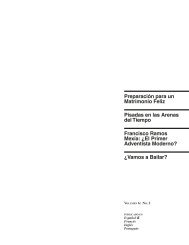Faith, reason, and the educated Christian Creationism - College and ...
Faith, reason, and the educated Christian Creationism - College and ...
Faith, reason, and the educated Christian Creationism - College and ...
Create successful ePaper yourself
Turn your PDF publications into a flip-book with our unique Google optimized e-Paper software.
How shall we worship?<br />
by Lilianne Doukhan<br />
It is <strong>the</strong> transformation of <strong>the</strong><br />
heart that will guarantee a<br />
genuine format of <strong>Christian</strong><br />
worship.<br />
Dialogue 15:3 2003<br />
We all worship in one way or<br />
ano<strong>the</strong>r. Even those who do<br />
not believe in religion, worship.<br />
They worship sports icons, music<br />
idols, or money. We are created for worship.<br />
God’s creation of Adam <strong>and</strong> Eve<br />
on <strong>the</strong> sixth day, <strong>the</strong> day preceding <strong>the</strong><br />
Sabbath, has a deep significance, both<br />
<strong>the</strong>ologically <strong>and</strong> sociologically. The<br />
Creator intended that, in <strong>the</strong> lives of<br />
human beings, worship must take priority<br />
over any o<strong>the</strong>r human activity. It is<br />
this priority that dem<strong>and</strong>s of God’s followers<br />
that <strong>the</strong>y not only worship, but<br />
also worship in <strong>the</strong> right way. The fact<br />
<strong>and</strong> manner of worship cannot be taken<br />
for granted.<br />
What is <strong>the</strong> right form of worship? Is<br />
<strong>the</strong>re only one correct form or style?<br />
Have worship forms changed over time?<br />
Who decides which form or format is<br />
appropriate? Setting aside personal<br />
opinions <strong>and</strong> preferences, we need to<br />
discover <strong>the</strong> answer from God’s Word.<br />
The meaning of worship<br />
The Scriptures provide us various<br />
models of worship. One of <strong>the</strong> clearest is<br />
in Isaiah 6:1-8 where <strong>the</strong> prophet relates<br />
his vision of a heavenly worship scene.<br />
This passage presents us with a program<br />
of worship, even an order of worship.<br />
The chapter opens with a vision of<br />
God on His heavenly throne, a vision of<br />
beauty, power, majesty, <strong>and</strong> reverence.<br />
Here we learn first why we come to worship:<br />
to respond to God’s presence <strong>and</strong><br />
His call for worship.<br />
The Psalms—Israel’s traditional worship<br />
<strong>and</strong> praise texts—help us find out<br />
how to worship: in joy <strong>and</strong> reverence.<br />
The <strong>the</strong>me runs through <strong>the</strong> Psalms <strong>and</strong><br />
is expressed in phrases such as, “Come,<br />
let us sing for joy to <strong>the</strong> Lord…Come,<br />
let us bow down in worship” (Psalms<br />
95:1, 6, NIV).<br />
To balance between joyfulness <strong>and</strong><br />
reverence presents a challenge. In worship<br />
services, we often practice one to<br />
<strong>the</strong> exclusion of <strong>the</strong> o<strong>the</strong>r, <strong>and</strong> somehow<br />
cannot find a way to combine <strong>the</strong><br />
two. It seems difficult to be reverent <strong>and</strong><br />
at <strong>the</strong> same time to be joyful. But this is<br />
what God’s Word tells us to do in worship.<br />
The Bible also presents worship as a<br />
wholistic activity. Worshipers are to approach<br />
God through <strong>the</strong>ir entire being.<br />
Biblical worship involves <strong>the</strong> spirit,<br />
mind, <strong>and</strong> physical senses. Isaiah 6<br />
speaks of worship as involving <strong>the</strong> four<br />
senses of seeing, hearing, smelling, <strong>and</strong><br />
touching.<br />
Worship is also a corporate act: We<br />
come to God as a body of believers. This<br />
involves both vertical <strong>and</strong> horizontal dimensions.<br />
Often in worship, we interact<br />
with people around us to a limited degree,<br />
but true worship must bring us<br />
closer not only to God but also to <strong>the</strong><br />
body of worshipers. Because our churches<br />
are more <strong>and</strong> more multi-cultural <strong>and</strong><br />
multi-generational, <strong>the</strong> horizontal dimension<br />
has become a challenge. Each<br />
of <strong>the</strong> different groups aspires to express<br />
worship in its own way.<br />
Fur<strong>the</strong>r, when we come to worship,<br />
we need to find out whom we worship.<br />
Worship is not something we do for<br />
ourselves. Worship is meant to be done<br />
for God <strong>and</strong> to God. It is a God-centered<br />
activity, entirely focused on Him (see<br />
Psalms 9:1, 2). We do not come to worship<br />
primarily to get blessings, to learn<br />
17

















